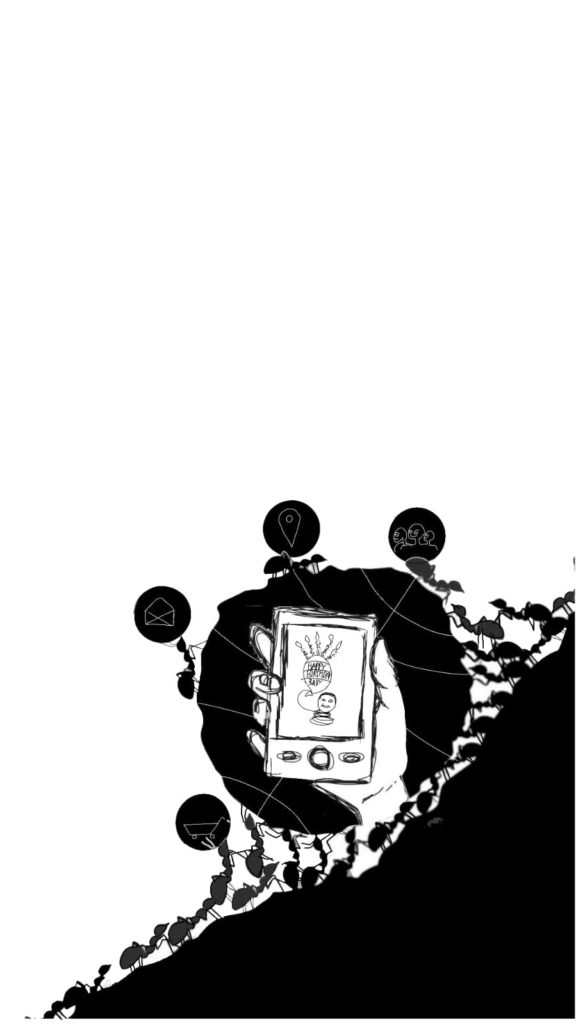Sugandha Agarwal
A camera and Social Media access (Facebook/Instagram/TikTok/Moj, etc.) in the same gadget seems like a match made it heaven. Quickly take a picture of what you are wearing, eating, or seeing and you can share it with the world within seconds. We live for likes! By now people can make an earning from posting on Social Media. We are all aware of social media’s (SM) dark side – addictions, cyber crime, fake profiles but that’s a discussion for another day.
Let us consider why we post details of our lives on social media. Most of us would respond with ‘sharing update and joyous moments with friends and family’, ‘seeking recommendations and help’, or at times ‘creating awareness about causes or supporting them’. It all boils down to the fact that the likes and comments provide external validation which we are missing in nuclear families. It is a joy to be able to witness the lives of our loved ones virtually, irrespective of which part of the world they live in, and a large part of sharing is content which includes minors. What we want to bring to the forefront is posting about children on Social Media and its consequences.
When thinking of the perils of the internet or social media, most of us would think of cyber crimes related to financial fraud, fake identity, catfishing, etc. and not beyond it. Would the thought come across our minds that the cute pic of our baby that we just posted online will trigger sexual thoughts in adult men? That we may find your baby’s face pasted on another child being abused in a video involving child pornography. That we can actually put our children at risk by unintentionally recording their daily movements in the background like their school’s name, and which parks they visit frequently. That their identities could be stolen via Deepfake and criminals can use them years later to create AI versions of the baby grown up, with a voice so real you cannot identify it is not real.
This would be enough to give sleepless nights to almost all parents but the world we live in needs us to be aware of the pros and cons of our choices and their impact not only on us but on the future of our kids. Almost every female reader of this article would have experienced abuse or at least a bad touch from a known male adult when she was a child. Surveys reflect that 3-6% of adult males have a sexual interest in prepubescent children. When we post our children’s pic indiscreetly on ‘public’ settings, yes we get wider audience, more likes, and more love for the content, but is it worth putting our children at potential risk? When we draw the attention of strangers to our minors, we are also conditioning them to enjoy that attention. We are instilling a deep-seated need for external validation in their pure hearts and minds, which can lead to mental health issues like depression or anxiety, a high appetite for risky behavior, and a predisposition to addictions or substance abuse once they are struggling with adolescence or teenage.
Grooming is a bigger threat that Indian parents are yet to realize. When we post our kids’ pictures or videos not only do we tag locations or post logos, we also upload technical information which laymen cannot read but IT experts can. This information is called Metadata and it can lead back to not just the location where the child was but to the IP address of your home. A simple tracking bug in your devices or WiFi opens a world of access to strangers who can approach our children online or physically, win their trust, and harm them. A simple search on ‘children groomed’ would bring up a long list of criminal cases where adults convinced children to come with them and rarely did the child make it alive after being abused and assaulted at times by multiple adults.
With social and family structures changing rapidly, we are already seeing broken families where children have become dissociated from their parents for unresolved issues. The right to privacy is an issue that has its roots deep in any relationship. As parents, we are so used to “making decisions” on behalf of our children that we often ignore their right to privacy. As adults, they might not be so forgiving towards us, especially if they got bullied due to the information their parents chose to drop online or were groomed or felt unsafe as strangers had access to their information. Children under 18 cannot give consent, even if they did it is not held per law. Once they are 18, they can sue the parents for breach of privacy for plastering their faces and details of their personal lives without their consent. There is a higher chance that excessive sharing of their lives may impact their relationships with parents when they grow up and realize that all info is already out which they would not want out.

A major threat parents need to reassess is posting children’s pics or videos on online groups for parenting or the causes they feel strongly about. Parents take up a cause and use children’s pics and videos without their consent. When you create an account on Facebook or Instagram, the platform makes you sign a consent for how your personal information will be stored and used, which third parties can access your information, and how you can prevent this information from going to a third party. But these restrictions are only on the data you submit while creating the account, like your name, age, date of birth, and email IDs. Most of us would have noticed that if we google search for something, or mention a product on WhatsApp to our friends, our social media accounts, and emails start showing advertisements for the same. After registration on these platforms, everything we do is being tracked and there are no measures for protecting information about our browsing or engaging via these.
The groups on these social media platforms do not comply with any Indian or International laws regarding data privacy and do not have any data controls under GDPR or upcoming DPDP laws. The group owners are not registered with authorities as data collectors or data processors, they do not own or lease servers on which they would manage the data, and have no control over how these groups will safeguard the minor’s info. Everything is available to steal and misuse. Going back to the statistics that 3-6% of males are paedophiles, are we comfortable sharing our kids’ data with absolute strangers with no one taking accountability for how its accessed or used?
A growing trend we see is people sharing their personal stories on channels that feature stories of grit, overcoming challenges, or advocacy groups for different causes. Since we are focusing on parenting for this month’s theme, a major cause for concern we feel is advocacy groups about adoption. Agreed that creating a positive narrative around adoption, sharing how it is popular, natural and a totally normal way to build is family is essential, do we really need to post pictures and videos of our children to support this cause? This is extremely personal information for our child, a very deep-seated trauma of rejection by the very first humans who created them and were supposed to be responsible for. Not all children were safely surrendered and their rejection or inhuman treatment by their biological families can be very traumatic to accept and get over. Imagine our children as adolescents or teenagers, coming to terms with this rejection, struggling with their identity and self-esteem. Now imagine that a classmate randomly throws it at them in school that they were adopted and their biological parents threw them away. We cannot even begin to imagine the hurt and its consequences on their tender hearts and minds. Once parents put this info online, its there forever. Anyone with a digital device and basic research skills can find out information extremely personal to the children and they might be bullied for it. In our enthusiasm to support our causes, we are taking away our children’s right to privacy and to share what info they want to share with their peers or outsiders. We are denying them a basic right to share their deepest trauma with whom they choose, it’s already out.
The world we live in does not allow us to not be on social media, we all love it, we all love the attention and external validation. We cannot stop posting absolutely. But as adults making decisions for children, we need to think hard about the ethics of to what extent should we put our children out there. Here are some measures we can take to mitigate the chances of our children’s data being misused:
- Make Facebook, Instagram and other profile settings to ‘friends only’ by default. While making a public post, change the setting manually to ‘Public’ for that specific post.
- Reels are generally ‘Public’ by default, change the settings to ‘friends only’.
- Update settings so that profile pictures cannot be screenshotted.
- When sharing pictures, look hard if the background in the picture, any boards, child’s school ID card is visible in pictures, which could be misused.
- Do not indulge in indiscriminate sharing of minor’s pics on any groups.
- In case you are giving minors’ pics/videos or any personally identifiable data (PII) pursuant to an invite from group owners – check with the group owners or moderators if they are registered as data collectors. What prevention measures do they have against the misuse of pics? If you are not convinced, err on the side of precaution and not submit the data.
- When promoting social causes take an ethical call if a minor’s name, pics, and videos are necessary to share. Can we not talk about the cause without sharing the PII of the child? Till the time it’s possible avoid putting PII out, if unavoidable, be wary and put minimal information out.
- Wait till your child can understand what you are doing and its consequences before using their information to promote your causes. They can’t legally give consent till they are 18. Using their PII can drastically increase the chances of their trauma being ousted making them prone to being bullied.
As parents, our first duty, first responsibility is toward our minors. We need to be more aware of the threats we bring to our doors by putting our minors’ data in the public domain. Being aware of data privacy laws and possible threats to us and our minors is the need of the hour. We need to look hard at the crumbs we leave which can lead predators to our minors and clean up our footprints NOW onwards.
Sugandha Agarwal
suguagarwal@yahoo.com
Sugandha is a corporate lawyer, who is currently part time freelancing and fulltime a single mom enjoying raising her 3 daughters. Her family consists of a 4 year old human girl and two 6 year old doggies, who motivate her to be a stronger, better mom each day.

